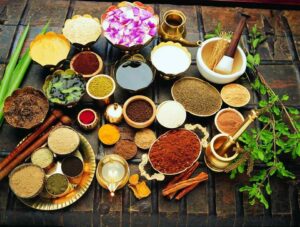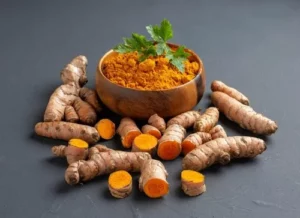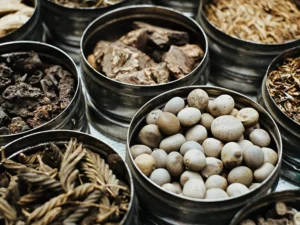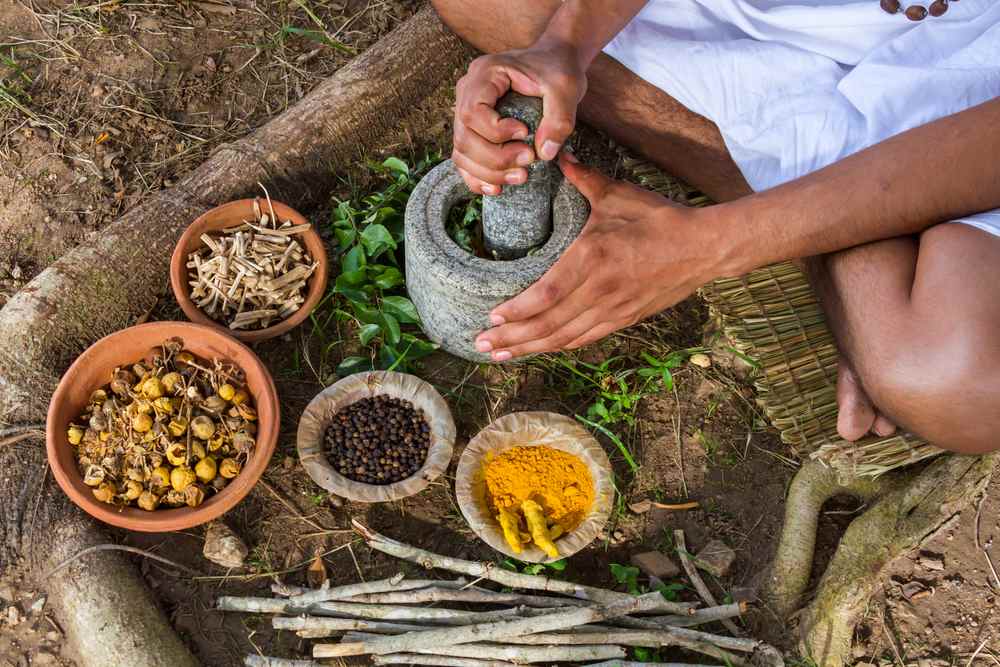Managing diabetes requires a comprehensive and mindful approach to health, and Ayurveda, the ancient Indian system of medicine, offers a holistic perspective to manage this condition. Ayurvedic remedies emphasize balance, harmony, and natural healing, providing individuals with diabetes with a unique set of tools to support their well-being. In this blog, we will explore the principles of Ayurveda and delve into effective Ayurvedic medicine for diabetes and practices that can play a pivotal role in management.
Contents
What Are The Principles Of Ayurveda?
 Ayurveda, the traditional system of medicine that originated in ancient India, is based on a holistic approach to health and well-being. The principles of Ayurveda are deeply rooted in the interconnectedness of the body, mind, and spirit. Here are some fundamental principles of Ayurveda:
Ayurveda, the traditional system of medicine that originated in ancient India, is based on a holistic approach to health and well-being. The principles of Ayurveda are deeply rooted in the interconnectedness of the body, mind, and spirit. Here are some fundamental principles of Ayurveda:
- Doshas: Vata, Pitta, and Kapha
Ayurveda classifies individuals into three doshas, which represent the fundamental energies or forces: Vata (air and space), Pitta (fire and water), and Kapha (earth and water). Each person has a unique combination of these doshas, and maintaining their balance is crucial for overall health.
- Prakriti (Constitution)
Prakriti refers to an individual’s unique constitution, determined by the dominant dosha or doshas present at birth. Understanding one’s Prakriti helps in tailoring lifestyle, diet, and health practices to maintain balance and prevent imbalances that can lead to illness.
- Dhatus (Tissues) and Malas (Waste Products)
Ayurveda recognizes seven bodily tissues (Dhatus) and three waste products (Malas) that play a role in maintaining health. The proper functioning and nourishment of these tissues are essential for overall well-being.
- Panchamahabhutas (Five Elements)
Ayurveda recognizes the influence of the five elements—earth, water, fire, air, and space—in the human body. Each dosha is associated with a specific combination of these elements, and balancing them is essential for maintaining health.
- Sattva, Rajas, and Tamas
These three gunas represent the qualities of the mind. Sattva is associated with purity and balance, Rajas with activity and passion, and Tamas with inertia and lethargy. Maintaining a balance among these qualities is important for mental well-being.
Understanding and applying these principles in daily life helps individuals align with their natural state of balance and promotes holistic well-being according to Ayurveda. It’s important to note that Ayurveda is a personalized system of medicine.
What Are Some Effective Ayurvedic Medicine For Diabetes?
It’s crucial to note that managing diabetes involves a holistic approach, and Ayurvedic medicine for diabetes is just one aspect of the overall strategy. Additionally, individual responses to Ayurvedic remedies may vary. Thus, it’s recommended to consult with an Ayurvedic practitioner for personalized guidance. Here are 10 Ayurvedic medicines for diabetes and herbs that are traditionally used:
Bitter Melon (Momordica charantia)
Bitter melon, commonly known as “Karela” in Ayurveda, is a well-regarded remedy for diabetes. Its efficacy lies in its ability to lower blood sugar levels naturally. Bitter melon contains compounds such as charantin. This is believed to have insulin-like effects, improving glucose utilization. Additionally, it may enhance insulin sensitivity and inhibit glucose absorption in the intestines. Consuming bitter melon in various forms, such as juice or as a vegetable in meals, is a common practice in Ayurvedic diabetes management.
Fenugreek (Trigonella foenum-graecum)
Fenugreek, or “Methi,” is a versatile herb with seeds rich in soluble fiber. The soluble fiber helps slow down the absorption of sugar in the digestive tract, leading to better blood sugar control. Fenugreek seeds also contain compounds like trigonelline, which may contribute to improved insulin sensitivity and reduced insulin resistance. Many people incorporate fenugreek seeds into their diet by soaking them overnight and consuming them in the morning or adding them to dishes.
Gudmar (Gymnema Sylvestre)
Known as the “sugar destroyer,” Gudmar has a long history of use in Ayurveda for managing diabetes. It is believed to reduce sugar absorption in the intestines, helping to lower blood sugar levels. Gudmar may also enhance insulin function and support the regeneration of pancreatic beta cells. And these are responsible for insulin production. This herb is often consumed in the form of capsules or as a tea, providing a natural approach to diabetes management.
Turmeric (Curcuma longa)
 Turmeric, containing the active compound curcumin, is celebrated for its anti-inflammatory and antioxidant properties. In the context of diabetes, curcumin may contribute to improved insulin sensitivity and reduced inflammation. Studies suggest that turmeric can positively impact insulin resistance and help regulate blood sugar levels. Integrating turmeric into the diet, either by using the spice in cooking or consuming it as a supplement, can be a valuable addition to a diabetes management plan.
Turmeric, containing the active compound curcumin, is celebrated for its anti-inflammatory and antioxidant properties. In the context of diabetes, curcumin may contribute to improved insulin sensitivity and reduced inflammation. Studies suggest that turmeric can positively impact insulin resistance and help regulate blood sugar levels. Integrating turmeric into the diet, either by using the spice in cooking or consuming it as a supplement, can be a valuable addition to a diabetes management plan.
Neem (Azadirachta indica)
Neem, with its potent anti-diabetic properties, is known for its ability to regulate blood sugar levels. It may enhance insulin sensitivity and promote healthy pancreatic function. Additionally, neem has antioxidant and anti-inflammatory effects, contributing to overall immune system support. Neem can be consumed in various forms, such as neem leaves, neem powder, or neem capsules, under the guidance of an Ayurvedic practitioner.
Amla (Emblica officinalis)
Amla, also known as Indian gooseberry, is a powerhouse of vitamin C and antioxidants. In the context of diabetes management, amla is recognized for its potential to regulate blood sugar levels. The antioxidants in amla may protect pancreatic beta cells from oxidative stress, contributing to improved insulin function. Consuming amla, whether in its raw form, as a juice, or as a supplement, can be a beneficial addition to an Ayurvedic diabetes care routine.
Triphala
Triphala is a combination of three fruits—Amalaki (Indian gooseberry), Bibhitaki, and Haritaki—known for their synergistic health benefits. In diabetes management, Triphala is valued for its digestive properties. It helps in maintaining a healthy digestive system, improving metabolism, and supporting overall well-being. Triphala can be consumed as a powder or in capsule form, with its use guided by an Ayurvedic practitioner based on individual needs.
Vijaysar (Pterocarpus marsupium)
Vijaysar, derived from the heartwood of the Indian Kino tree, has been traditionally used in Ayurveda for its potential hypoglycemic effects. It is believed to help regulate blood sugar levels by promoting insulin sensitivity. Vijaysar may also have a positive impact on lipid metabolism, making it a valuable component in Ayurvedic approaches to diabetes. Vijaysar is often used in the form of wooden tumbler extracts, where water is soaked overnight in a vijaysar tumbler and consumed in the morning.
Guggul (Commiphora wightii)
Guggul, derived from the resin of the Commiphora wightii tree, is recognized for its anti-inflammatory properties. In the context of diabetes, guggul may support the maintenance of healthy blood sugar levels. It is believed to have a positive impact on lipid metabolism, potentially reducing cholesterol levels. Guggul can be consumed as a supplement. Its use should be guided by an Ayurvedic practitioner to ensure its appropriateness for individual needs.
Shilajit
Shilajit is a mineral-rich substance formed over centuries in the Himalayan mountains. In Ayurveda, it is considered a potent rejuvenator. Shilajit may have anti-diabetic effects, as studies suggest it can enhance insulin sensitivity and improve mitochondrial function. Additionally, it exhibits antioxidant properties. Shilajit is typically consumed as a supplement. Hence, its use should be guided by an Ayurvedic practitioner to ensure appropriate dosage and suitability for individual health conditions.
It’s crucial to approach Ayurvedic remedies with caution and under the guidance of a qualified practitioner. Individual responses to these herbs can vary. Thus, their effectiveness should be monitored alongside conventional medical care for diabetes. Overall, you should always consult with a healthcare professional before incorporating new supplements or herbs. Especially if you are on medication for diabetes.
What Are The Benefits Of Ayurvedic Medicine For Diabetes?
 Ayurvedic medicine for diabetes aims to provide holistic and natural support for individuals managing this condition. While it’s important to note that Ayurveda doesn’t offer a permanent cure for diabetes, incorporating the principles into the overall diabetes management plan may offer several potential benefits:
Ayurvedic medicine for diabetes aims to provide holistic and natural support for individuals managing this condition. While it’s important to note that Ayurveda doesn’t offer a permanent cure for diabetes, incorporating the principles into the overall diabetes management plan may offer several potential benefits:
Blood Sugar Regulation
Many Ayurvedic herbs and remedies are believed to have hypoglycemic effects, helping to regulate blood sugar levels. They may enhance insulin sensitivity, reduce insulin resistance, and improve the utilization of glucose in the body.
Improved Insulin Sensitivity
Certain Ayurvedic herbs, such as gudmar, fenugreek, and vijaysar, are traditionally used to enhance insulin sensitivity. This can contribute to better glucose uptake by cells and improved overall insulin function.
Antioxidant and Anti-inflammatory Effects
Many Ayurvedic herbs, including turmeric, neem, and amla, possess antioxidant and anti-inflammatory properties. These properties may help protect pancreatic beta cells from oxidative stress and inflammation, supporting their optimal function in insulin production.
Enhanced Digestive Health
Ayurveda places a strong emphasis on digestive health, as efficient digestion is crucial for proper nutrient absorption. Herbs like triphala are used to support digestive processes, potentially aiding in better metabolism and nutrient utilization.
Balanced Doshas
Ayurveda views diabetes as an imbalance in the doshas, particularly in the context of impaired metabolism (Agni) and the accumulation of toxins (Ama). Ayurvedic interventions aim to restore balance to the doshas, promoting overall well-being and harmony in the body.
Lipid Metabolism Support
Some Ayurvedic herbs, such as guggul, are traditionally used to support lipid metabolism. This may contribute to a reduction in cholesterol levels, which is important for individuals with diabetes who often have an increased risk of cardiovascular complications.
Support for Immune Function
 Certain Ayurvedic herbs, like neem and amla, are known for their immune-boosting properties. Strengthening the immune system can be beneficial for individuals with diabetes who may be more susceptible to infections.
Certain Ayurvedic herbs, like neem and amla, are known for their immune-boosting properties. Strengthening the immune system can be beneficial for individuals with diabetes who may be more susceptible to infections.
It’s important to approach Ayurvedic medicine for diabetes interventions with the guidance of a qualified Ayurvedic practitioner. Moreover, individuals should continue to monitor their blood sugar levels regularly, follow a balanced diet, engage in regular exercise, and adhere to any prescribed medications from their healthcare provider.
Conclusion
In conclusion, Ayurvedic medicine for diabetes offers a holistic and natural approach, focusing on the interconnectedness of the body, mind, and spirit. Through the use of herbs like bitter melon, fenugreek, and gudmar, Ayurveda aims to regulate blood sugar levels, enhance insulin sensitivity, and support overall well-being. Additionally, practices such as yoga, meditation, and personalized dietary guidelines contribute to a balanced lifestyle.
While Ayurvedic remedies can be beneficial, it’s crucial to integrate them into a comprehensive diabetes management plan, consulting with both Ayurvedic practitioners and healthcare professionals. By embracing the wisdom of Ayurveda alongside conventional approaches, individuals can empower themselves in the journey towards better health and diabetes control.
Do you want to get rid of diabetes? Join our online diabetes treatment program and reverse Diabetes naturally through lifestyle changes such as a Personalized Diet plan, Exercise, Yoga, dieticians, and health coaches.

